Peek into the biblical significance of beards, unveiling layers of masculinity, wisdom, and spirituality that demand a closer look.
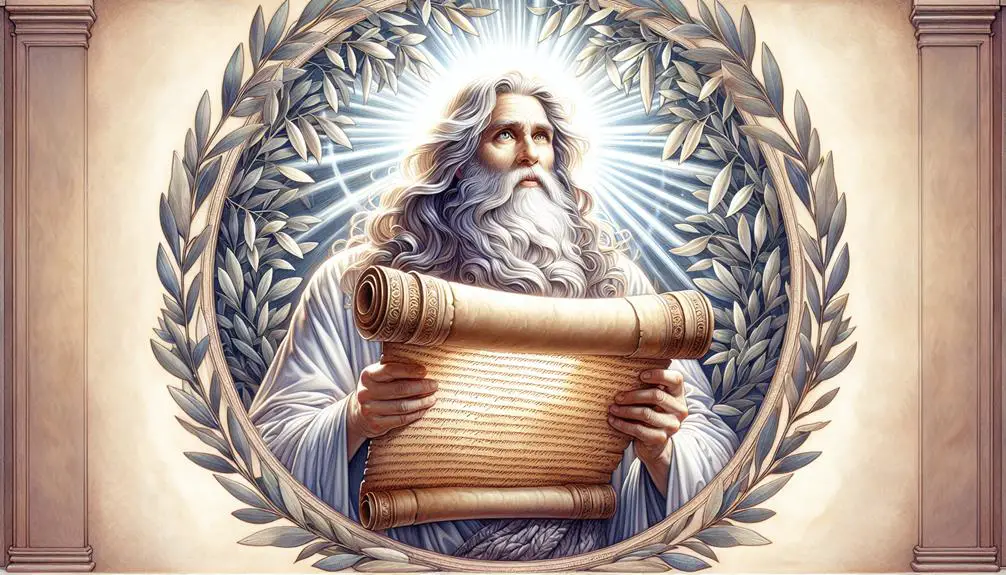
What Do Beards Symbolize in the Bible
In the sprawling tapestry of biblical narratives, beards aren't just facial hair; they're practically characters in their own right, carrying a weight of symbolic meanings that you might find as intricate as the stories themselves. From signifying masculinity and wisdom to expressing mourning and denoting holiness, beards weave a fascinating narrative of social, spiritual, and personal identity.
You'll find that understanding the symbolism of beards can offer a deeper insight into the biblical times and the messages conveyed through these ancient texts. So, why not explore what lies beneath the surface of this seemingly simple topic and uncover how it reflects broader themes within the Bible?
Key Takeaways
- Beards in the Bible symbolize masculinity, spiritual maturity, and adherence to societal norms.
- Shaving or tearing one's beard indicated mourning, repentance, and profound grief.
- They represent a connection between physical appearance and spiritual holiness as per divine command.
- Beards reflected social status, wisdom, and were respected indicators of leadership and authority.
Significance of Masculinity
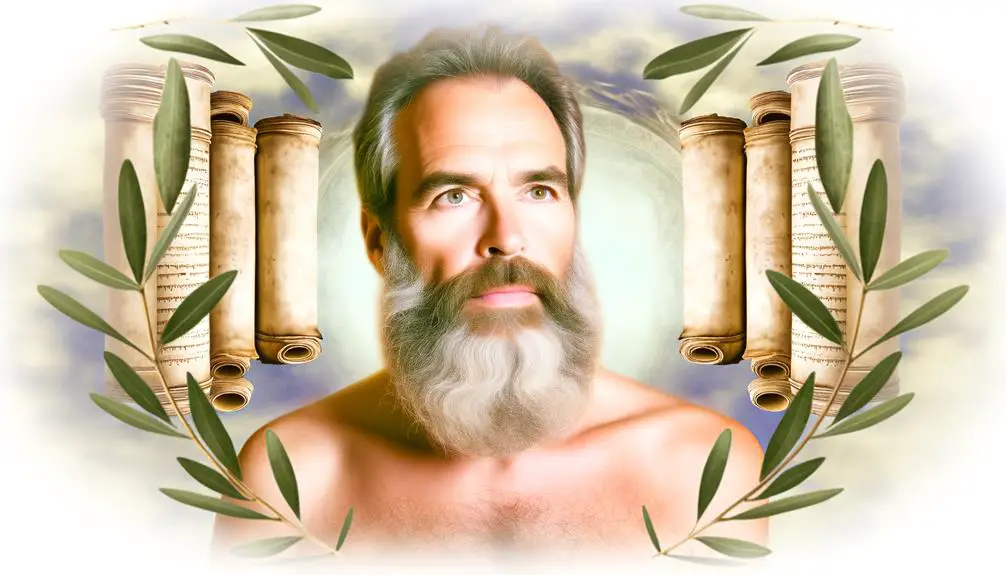
In biblical times, beards served not merely as facial hair but as potent symbols of masculinity, reflecting societal norms and spiritual maturity. This symbolism was deeply intertwined with the prevailing gender roles and warrior imagery of the era, casting beards as an essential marker of a man's status and strength. Within this context, the presence or absence of a beard could speak volumes about a man's role in society, his age, and his virility.
Analyzing the scriptural references and historical accounts, it's evident that beards were more than just a personal choice or fashion statement. They were a visual representation of a man's ability to lead, protect, and provide, aligning closely with the expectations of male figures during biblical times. This connection between beards and masculinity was further reinforced through warrior imagery, where warriors were often depicted with full, well-groomed beards, symbolizing their prowess, courage, and readiness for battle.
Moreover, the significance of beards in delineating gender roles was paramount. In a society where physical appearance was a key indicator of one's identity, beards helped to distinguish men from women, underlining the importance of adhering to the gender norms of the time. This distinction wasn't only physical but also carried spiritual connotations, linking the concept of masculinity with divine favor and moral integrity.
In essence, beards in biblical times weren't merely aesthetic; they were laden with cultural and spiritual meanings, reflecting the complexities of gender roles and the valorization of warrior imagery.
Expression of Mourning
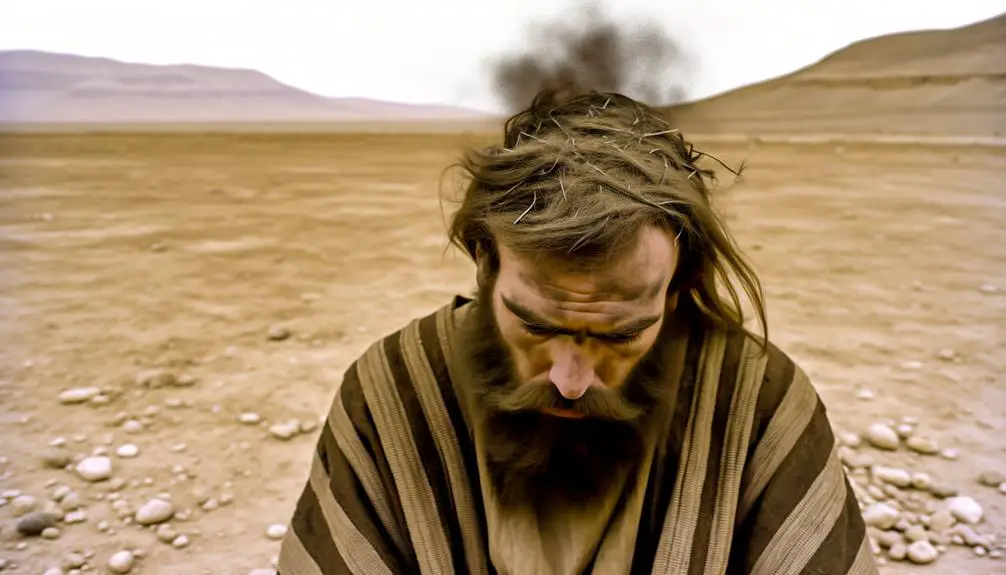
In the biblical context, you'll find that beards hold significant symbolism in expressing mourning. The act of shaving or altering one's beard during times of grief serves as a poignant outward display of internal sorrow.
This practice, embedded within mourning rituals, reflects the depth of bereavement and cultural attitudes towards loss.
Shaving in Grief
Shaving one's beard, as depicted in the Bible, often symbolizes profound grief and serves as a tangible expression of mourning. This act transcends mere personal hygiene, embedding itself deeply within the cultural norms of the time.
It's an illustrative badge of sorrow, signaling a departure from everyday routines and social expectations. Unlike other practices of the era, which might've prioritized appearance or personal cleanliness, shaving in grief underscores a deliberate disengagement from such societal dictates.
It's a physical manifestation of inner turmoil, a visual cue to the community that one is grappling with loss. This scholarly analysis reveals how, in biblical times, the act of shaving wasn't just about personal care but was intrinsically linked to the expression of mourning and grief.
Mourning Rituals Displayed
Beyond shaving, various mourning rituals in the Bible serve as poignant expressions of sorrow, each carrying deep symbolic meaning within the cultural and religious contexts of the time.
Fasting practices and clothing rending stand out as particularly emblematic actions. Fasting, the deliberate abstention from food, signifies a profound personal sacrifice and a focus on spiritual needs over physical sustenance. This act of denial reflects an individual's or community's grief and their reliance on divine support during times of loss.
Meanwhile, the rending of clothing, a dramatic and visible sign of distress, symbolizes the mourner's inner turmoil and the irreparable nature of their loss. These practices, rich in symbolism, underscore the depth of grief and the multifaceted ways it was expressed and experienced.
Marks of Wisdom

You'll find that in biblical contexts, beards often serve as a visual manifestation of wisdom. This symbolism extends to the association of beards with the respect afforded to elders, positioning them as signifiers of wisdom and experience.
Analyzing these representations provides insight into the cultural and religious valuation of wisdom in ancient times.
Wisdom's Visual Manifestation
In the context of biblical narratives, beards often serve as a visual manifestation of wisdom and maturity, symbolizing a person's experience and understanding. This perspective is not only a religious one but also intersects with cultural interpretations and fashionable trends, reflecting a broader societal recognition of beards as marks of wisdom.
Aspect |
Cultural Impact |
Fashionable Trends |
|---|---|---|
Visual Symbol |
Sign of respect and maturity |
Associated with wisdom |
Biblical Context |
Represents knowledge and divine insight |
Less emphasized |
Cultural Shifts |
Varies across societies and time |
Influences perceptions |
Personal Identity |
Expresses individuality and beliefs |
Aligns with modern styles |
Analyzing the depiction of beards within these dimensions offers a comprehensive understanding of their significance as wisdom's visual manifestation in biblical and contemporary contexts.
Elders' Respectful Signifier
Delving into the significance of beards among elders, we find they often symbolize not just wisdom, but also command a deep respect within biblical narratives and beyond. Beards serve as a visual marker denoting individuals who play pivotal roles within their communities, particularly in relation to:
- Leadership roles
- Religious duties
- Counsel and guidance
- Societal arbitration
This facial attribute, therefore, isn't merely an aesthetic choice but a signifier of experience and authority. Elders with beards are often depicted as the custodians of tradition and knowledge, embodying both spiritual and temporal leadership. Their beards symbolize a life of dedication to their communities, marking them as respected figures who wield significant influence in both religious and secular spheres.
Symbols of Holiness
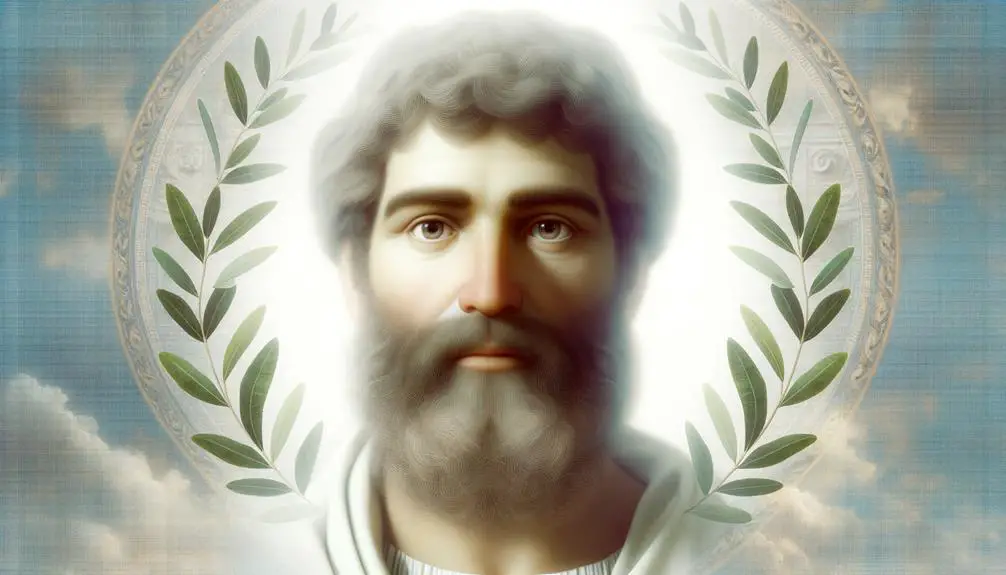
Many cultures, including those depicted in the Bible, regard beards as symbols of holiness and spiritual maturity. This perspective isn't arbitrary but is deeply rooted in religious texts and practices. The Bible itself contains references that tie the presence of a beard with divine command and purity representation. These elements highlight not just a physical attribute but a spiritual emblem as well.
Delving deeper, the Levitical laws, for instance, provide specific mandates regarding beards. Leviticus 19:27 advises against marred edges of beards, which scholars interpret as a directive aimed at preserving one's natural state as a reflection of divine creation. This injunction isn't merely about physical appearance but symbolizes a broader principle of purity and sanctity. Beards, then, become a visual cue of one's adherence to divine commandments, representing a physical manifestation of inner holiness.
Moreover, the act of not cutting the beard was also seen as a sign of mourning and respect towards God's creations, further linking the beard with a state of spiritual purity and dedication. This practice underscores the beard's role as more than mere facial hair; it's a symbol of one's commitment to living a life that's in line with divine expectations.
In this light, beards in the biblical context symbolize a profound connection between the physical and spiritual realms. They're not just markers of age or wisdom but signify a deeper adherence to holiness and purity as dictated by divine command. This symbolic representation underscores the beard's significance in biblical narratives and its revered status among the faithful.
Indicators of Age and Maturity

Beyond their spiritual significance, beards also serve as markers of age and maturity in the biblical narrative, reflecting societal perceptions and values. This characteristic highlights the deep interconnection between cultural norms and religious interpretations within the text. As you delve into the biblical references and contexts, you'll notice that beards aren't merely facial hair; they're emblematic of an individual's journey from youth to wisdom.
In the Scriptures, the presence of a beard often signifies a transition into manhood and the accumulation of life's experiences. This symbolic usage aligns with the broader cultural norms of the time, where physical attributes were seen as external manifestations of internal truths. Here are four ways beards symbolize age and maturity in the Bible:
- A Sign of Adulthood: Growing a beard marked the passage from boyhood to adulthood, a visible cue to society of a young man's entry into the realm of mature responsibilities.
- Wisdom and Respect: Elders were often depicted with beards, suggesting not only their longevity but also their wisdom and the respect afforded to them by their communities.
- Mourning and Repentance: The act of tearing one's beard in times of mourning or penance underscored the depth of one's sorrow but also the maturity to confront and express such emotions.
- Covenant and Commitment: Beards, in certain contexts, symbolized a man's commitment to God's covenant, reflecting a mature faith that goes beyond youthful zeal.
These aspects underscore the multifaceted role of beards in conveying age and maturity, deeply intertwined with cultural and religious interpretations.
Representation of Social Status
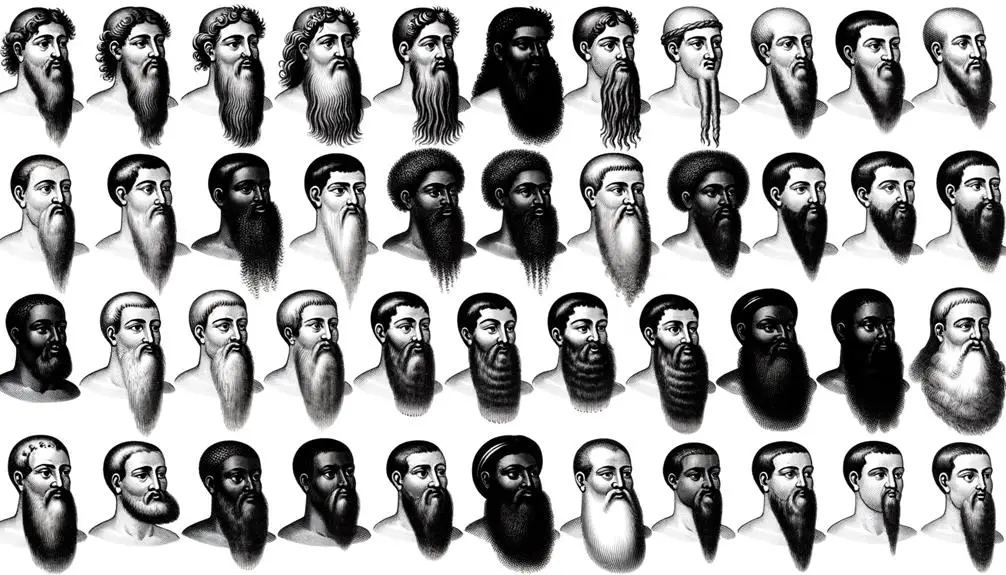
In biblical times, the presence and style of a beard often reflected an individual's social status, distinguishing the wealthy and powerful from the common folk. This distinction was deeply embedded in cultural practices and religious mandates, highlighting the significance of beards beyond mere facial hair.
The grooming and maintenance of beards, for instance, served as a visual indicator of one's position within the social hierarchy. Those with the means would often have well-kept, ornately groomed beards, symbolizing not only their wealth but also their adherence to cultural and religious norms.
On the other hand, the common people, whose daily lives were consumed by labor and lacked the luxury of time and resources, typically had less elaborate facial hair. This contrast wasn't merely cosmetic but deeply symbolic, reflecting broader societal structures and values.
Moreover, specific religious mandates regarding beard grooming and trimming further complicated this dynamic, as adherence to these rules signified piety and respect for divine laws, traits highly esteemed in ancient societies.
Thus, the beard transcended its physical form to become a potent symbol of one's social standing, religious devotion, and adherence to cultural norms. It was a visible marker that conveyed a wealth of information about an individual's identity and place within the social and spiritual fabric of biblical times. As such, understanding the role of beards in this context requires a nuanced appreciation of the complex interplay between cultural practices and religious mandates that governed ancient societies.
Frequently Asked Questions
How Do Biblical Regulations About Beards Reflect on Personal Hygiene and Grooming Practices in Ancient Times?
In ancient times, biblical regulations about beards reflected personal hygiene and grooming practices, emphasizing cleanliness and respect.
You'd find that beard styles weren't just about aesthetics; they conveyed social status and adherence to religious norms.
Grooming tools, albeit primitive, were essential for maintaining these styles, indicating an early understanding of personal care.
This approach to grooming highlights how cultural and religious beliefs significantly influenced personal hygiene practices.
In What Way Did the Shaving or Not Shaving of Beards Impact Religious Rituals and Offerings in the Bible?
In analyzing how the shaving or not shaving of beards influenced religious rituals in ancient texts, it's crucial to note the underlying signals regarding marital status and economic implications.
For instance, a cleanly shaven face might denote a change in marital status or economic standing, affecting one's participation in certain rituals.
This practice highlights the deep interconnection between personal grooming and the spiritual or societal roles individuals held within their communities.
Can the Growth or Removal of Beards in Biblical Narratives Be Seen as Acts of Defiance or Submission to God's Will?
Like a tree shedding leaves in autumn, the growth or removal of beards in biblical stories often signals acts of cultural defiance or submission to divine will.
You'll find that these actions aren't just about personal grooming; they're deeply intertwined with social status and religious obedience.
Analyzing these narratives, it's clear that facial hair can symbolize a pivot point between aligning with societal norms or challenging them, reflecting a deeper, spiritual journey.
How Do Biblical Views on Beards Contrast With Other Ancient Cultures' Perspectives on Facial Hair at the Time?
You're exploring how biblical views on beard symbolism contrast with other ancient cultures' perspectives on facial hair.
Unlike some societies where beards signified wisdom or status, the Bible presents a more nuanced picture, intertwining religious obedience with personal grooming.
This divergence highlights cultural contrasts, where facial hair's meaning shifted based on religious, social, or political contexts.
It's a fascinating study of how similar practices can hold vastly different significances across cultures.
Are There Any Specific Biblical Characters Whose Spiritual Journeys Are Symbolized Through Changes in Their Beard's Appearance?
Ironically, you'd think beards are just about looks, but delve deeper into biblical narratives, and you'll find they're teeming with profound symbolism.
Consider the tale of Samson, whose strength and spiritual journey are intricately tied to his locks' length, a form of beard vow in itself.
This symbolic grooming signifies more than aesthetic choices; it's a testament to divine covenant and personal transformation—an analytical glimpse into the soul's journey through facial hair.
Conclusion
In analyzing biblical references, it's clear that beards aren't just facial hair but carry profound symbolic weight. They embody masculinity, express mourning, signify wisdom, denote holiness, indicate age and maturity, and reflect social status.
As you've peeled back the layers, it's evident that beards in the Bible are more than meets the eye, serving as a multifaceted symbol that enriches our understanding of biblical characters and their societal contexts.
This exploration sheds light on the intricate tapestry of symbolism woven throughout sacred texts.

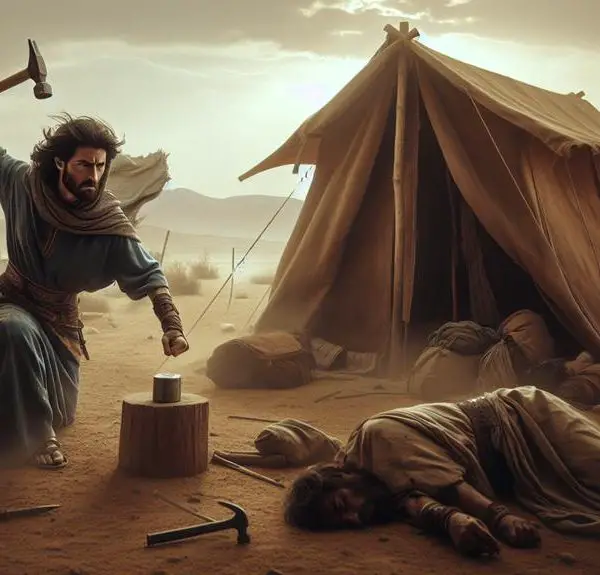

Sign up